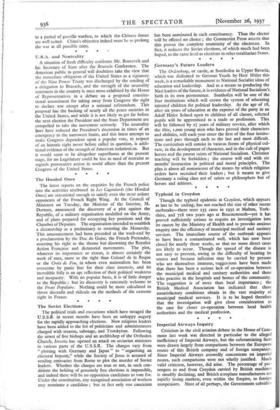U.S.A. and Neutrality A situation of fresh difficulty confronts Mr.
Roosevelt and his Secretary of State after the Brussels Conference. The American public in general will doubtless take the view that the immediate obligation of the United States as a signatory of the Nine Power Treaty was discharged by the sending of a delegation to Brussels, and the strength of the neutrality sentiment in the country is once more exhibited by the House of Representatives in a debate on a proposed constitu- tional amendment for taking away from Congress the right to declare war except after a national referendum. This proposal has the backing of nearly all the peace societies in the United States, and while it is not likely to get far before the next election the President and the State Department are compelled to take the movement seriously. The neutrality laws have reduced the President's discretion in times of an emergency to the narrowest limits, and this latest attempt to make Congress dependent upon a popular vote, in respect of an historic right never before called in question, is addi- tional evidence of the strength of American isolationism. But it would seem to be altogether superfluous at the present stage, for no Legislature could be less in need of restraint as regards provocative action in world affairs than the present Congress of the United States.














































 Previous page
Previous page